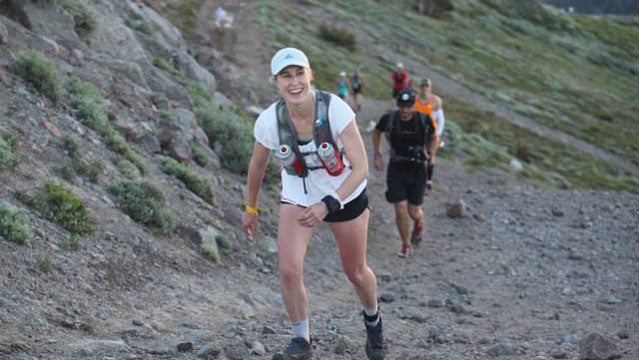When you’re a parent of young children and work full time, you can come up with plenty of excuses for blowing off exercise. Just don’t tell them to Pam Smith. The 38-year-old ultrarunner and pathologist logged 100-plus mile weeks this spring while training for the , in late June. The effort more than paid off. Smith won the women’s field in 18:37:21, besting her disappointing 2012 finish (when she was plagued by hypothermia) by 11 hours. “I certainly didn’t go into the race thinking I would win,” says Smith, “but my training had gone well and I had high expectations.”
More Raising Rippers:
Katie Arnold and other columnists on family adventure and bringing up active children.Ěý
I caught up with Smith on her way home from winning the (in 3:26:40) to find out how she juggles the trifecta of parenting, running, and working. Her secret: equal parts dogged perseverance and letting go.
Ěý
Did you start running ultras before or after you had kids?
Oh, after. I had always been a road runner, but after college I mostly just did recreational runs. I hadn’t been running seriously for three years when I got back into it in January 2008. My daughter was three and my son was one-and-a-half.
Ěý
Why did you decide to jump right into ultras?
I’ve always known I do better as the distances get longer. I get in the zone, and I like that aspect of it. Plus, I ran 10Ks in college and knew it’d be difficult to hit those times again.
Ěý
How do you find time for your training, your kids, and your job?
For the most part, the majority of my training happens between 5 AM and 7 AM, when my kids are still in bed. My husband is a runner, too, and Saturday is my day for a long run, and Sunday is his. On Wednesdays we hire a babysitter and go for a run together after work. Then we go out to a brew pup for dinner. He’s is a stay-at-home dad. That certainly takes the pressure off and makes it easier for our family. Fortunately I have regular hours at work. I’m at work by 8 AM and usually home by 4. I typically only work four days a week.
Ěý
It sounds like you’ve actually found real balance.
Working, parenting, and running is all that I do. And it is a good balance. What’s not sustainable is adding other things. I can’t go to movies. I don’t read a lot of books. My house isn’t as clean as I’d like it to be.
Ěý
How did your training go this season?
I worked pretty hard this year to gradually increase my miles, starting back in January. A lot of times when I go up in miles, I feel run down, but this year, I felt good. I was also doing more hill work. I knew I was prepared for the race, and that gave me confidence. I was also more cognizant of diet and made sure I drank a recovery drink right after my run. I look for a good mix of protein and carbs, and usually mix it myself.
Ěý
How much volume are you talking about?
My highest week was 108 miles. At my peak I ran 287 miles in 20 consecutive days.
Ěý
Road or trail?
Salem is not a great place for trails, so almost all my weekly running is on roads. This helps with my speed and turnover. On Saturdays, I go to Corvallis to run trails with a group of runners there.
Ěý
Do you follow a training plan or work with a coach?
I’ve always been self-coached. I sit down and write out my schedule a couple of weeks in advance. I have a general idea of my training, but I’ve been more scheduled this year—instead of just waking up and deciding what to do on any given day, I plan ahead. I run with a group of runners in Salem, mostly marathoners. On Monday we do track works, medium runs on Tuesdays and Thursdays, tempo runs on Wednesdays. I run hills on Fridays, and Saturdays are my long runs.
Ěý
Have you ever been injured?
I’m been pretty fortunate. There’s been nothing that’s taken me out of training. I’m pretty good about taking days off or changing my schedule if I’m too tired, and I’m pretty liberal with recovery. I think I take longer to recover than most people. I felt tired for three weeks after Western States. I didn’t run at all for the first ten days. I knew that it was a big effort and I just needed time to chill out. I had a lot of leftover fatigue. But even though I take ample recovery time, I don’t take extended breaks and I can usually jump back into the same mileage.
Ěý
Do you cross-train?
I try to do yoga once a week to help with mobility and go to the gym for cross training twice a week. It doesn’t always happen. Those are the first to go in the schedule.
Ěý
You also changed your diet pretty dramatically this year.
Yes, I started eating meat again after 17 years. I became a vegetarian for health reasons, but I think I gave myself a lot of leeway to eat junk. A lot of it was high processed carbs. So I added meat and I cut out processed grains and almost all wheat.
Ěý
What a difference a year makes. What went wrong at the Western States in 2012?
My biggest issue is I didn’t come prepared for the cold that day. I was so set in my mind that the Western States is a hot race. I didn’t have the necessary equipment and I got hypothermic and everything snowballed. I couldn’t eat. I stopped being able to use my fingers, so I couldn’t open my zippers. I also gained eight pounds and was put on medical hold for two hours. They made me sign a medical waiver before I left the tent, acknowledging that I could die on the trail and there might be no aid. A lot went wrong but I still wanted to finish.
Ěý
Once I let go of wanting to meet my performance goals, it was a positive experience. The runners at the back of the pack are a little chattier than those up front, and I got to see the sunrise and the early morning light in the canyons was just amazing.
Ěý
What’s the hardest part about training for a hundred?
The dedication. You have to put in two to three months without letting up.
Ěý
Everybody has their own reasons for running ultras. Why do you love to go the distance?
I think I started doing it for the challenge—to see what I could do. And also maybe originally out of insecurity: Am I good enough? I’m going to go out and prove it. Now that I have, it’s a way to escape the normal stressors of daily life. I love being out in such wonderful places. I love the peace.


